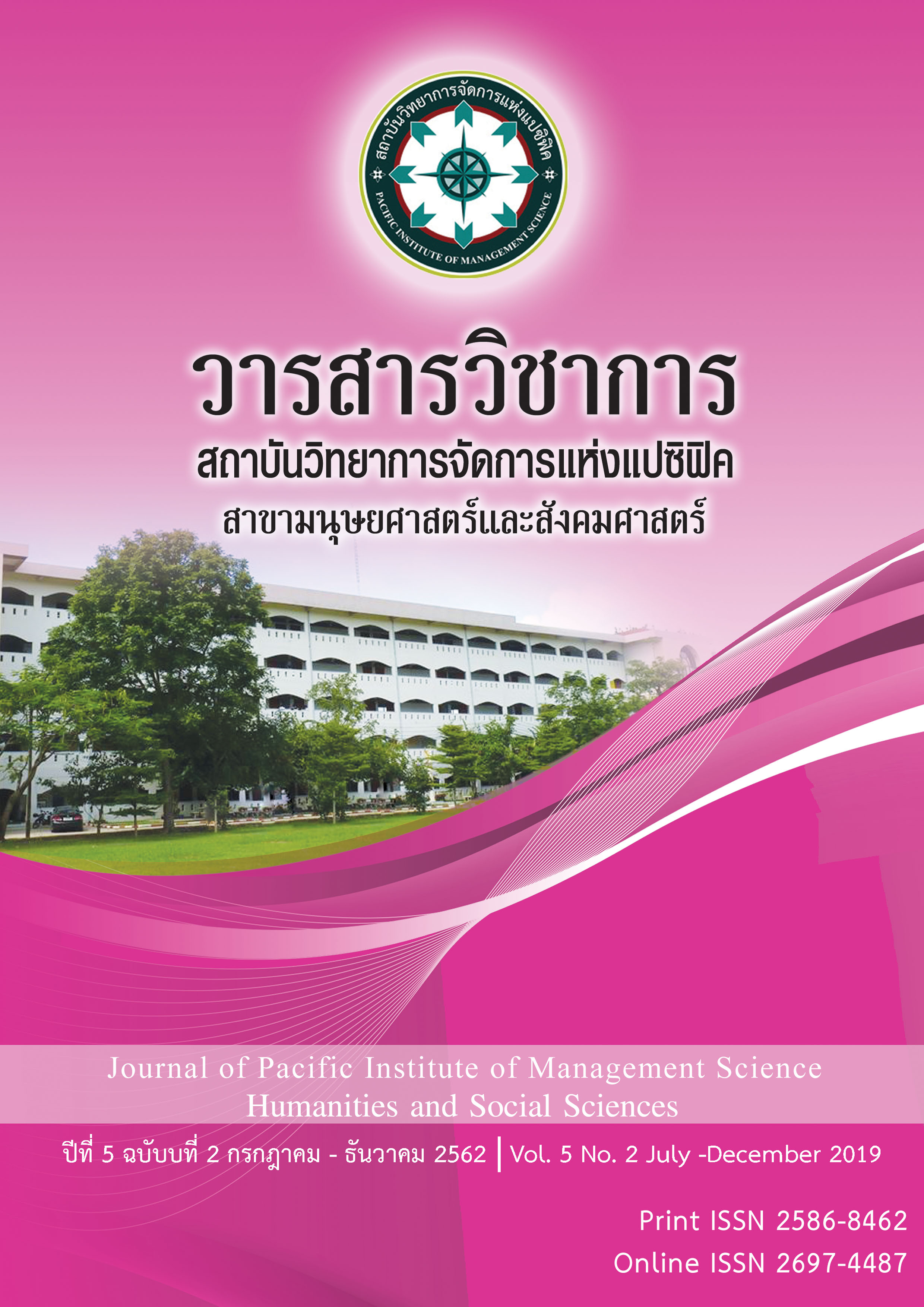THE ROLE OF FOOD CULTURE AND DEVELOPMENT OF GASTRONOMIC CITY WITH CREATIVE ECONOMY CONCEPT: A CASE OF BANGKOK
Keywords:
Gastronomic Culture, Gastronomic City, Creative Economy, BangkokAbstract
This research is a qualitative research to study the role of food culture and development of gastronomic city with creative economy concept in the context of Bangkok. It is a qualitative research, using the following data collection methods 1. Documentary Research studying those documents relevant to food culture, creative economy, gastronomic city, and other related documents 2. In-depth interview 3. Participatory Action Research by which data were collected by both observation and focus group interview methods. The researcher analyzed these qualitative data by content analysis to propose prototype for development of Bangkok as a gastronomic city with creative economy concept.
This study found that Gastronomic culture is an essential factor based on the concept of creative economy helping adding value to tourism business, public and people sectors. Government especially BMA should pay attention to and promote local gastronomic cultures in at least 4 ways 1. Food Cleanliness and safety 2. Food Nutrition 3. Food culture 4. Food as medicine. This is to create an image of the gastronomic city of Bangkok and respond to tourist’s needs sustainably.
References
การดี เลียวไพโรจน์ และคณะ. (2556). เปิดกล่องความคิด เศรษฐกิจสร้างสรรค์. พิมพ์ครั้งที่ 2. กรุงเทพฯ: บริษัท แอคทีฟ พริ้นท์ จำกัด.
กรวรรณ สังขกร.(2556). การพัฒนาศักยภาพชุมชนวัฒนธรรมสร้างสรรค์เพื่อสนับสนุนเชียงใหม่เมืองสร้างสรรค์. สืบค้นเมื่อ 15 มีนาคม 2556, http://www.sri.cmu.ac.th/~cct/?p=440
ชาย โพธิสิตา. (2552). ศาสตร์และศิลป์แห่งการวิจัยเชิงคุณภาพ. พิมพ์ครั้งที่ 4. กรุงเทพฯ: บริษัทอมรินทร์พริ้นติ้วแอนด์พับลิชชิ่ง จำกัด (มหาชน).
นฤดล บุญหลง และ กล้าณรงค์ ศรีรอต. (2556). อาหารเพื่อมนุษยชาติ. พิมพ์ครั้งที่ 2. กรุงเทพฯ: มหาวิทยาลัย
เกษตรศาสตร์.
สุณัฐวีย์ น้อยโสภา.(2561). ความแตกต่างทางวัฒนธรรมปัจจัยสำคัญในการขยายธุรกิจสู่ตลาดโลก. วารสารวิชาการ มหาวิทยาลัยธนบุรี, 12(27): 187-194.
สุภางค์ จันทวานิช. (2561). วิธีการวิจัยเชิงคุณภาพ. พิมพ์ครั้งที่ 24. กรุงเทพฯ: สำนักพิมพ์แห่งจุฬาลงกรณ์มหาวิทยาลัย.
สิริพันธุ์ จุลกรังคะ และอัญชนีย์ อุทัยพัฒนาชีพ. (2556). อาหารเพื่อมนุษยชาติ. พิมพ์ครั้งที่ 2. กรุงเทพฯ: มหาวิทยาลัย
เกษตรศาสตร์.
ปรเมธี วิมลศิริ. (2552). ทำไมต้องเศรษฐกิจสร้างสรรค์. กรุงเทพฯ: บริษัท คอนแทรคท์ พับลิซิ่ง จำกัด.
Cuevas, R.P., Guia, A.de., & Demont, M. (2017). Developing a framework of Gastronomic systems research to Unravel Drivers of Food Choice, International Journal of Gastronomy and Food Science, 9(2017): 88–99.
Dhora, R., & Dionizi, B. (2014). The Role of the Restaurant Sector in Promoting the Local Cuisine: The Case of Shkodra City, Academic Journal of Interdisciplinary Studies MCSER Publishing, 3(2): 327-332.
Draskovic, S. (2016). Gastronomy and Tourism Destination Competitiveness, SITCON 2016 - Singidunum International Tourism Conference, 150-154. Retrieved February 15, 2010, from DOI: 10.15308/Sitcon-2016-150-154
Du Rand, GE., & Heath, E. (2006). Towards a Framework for Food Tourism as an Element of Destination Marketing. Current Issues in Tourism, 9(3): 206-234.
Galvez, J.C.P., Lopez-Guzman, T., Buiza, F.C., & Medina-Viruel, M.J. (2017). Gastronomy as an Element of Attraction in A tourist Destination: The Case of Lima, Peru, Journal of Ethnic Foods, 4(4): 254-261.
Londono, Maria Del Pilar Leal. (2011). Gastronomy tourism: an opportunity for local development in Catalonia? A stakeholder analysis Retrieved February 15, 2018, from http://hdl.handle.net/
/120176.
Lopez-Guzman, T., Jose, MHM., & Elide, DC. (2016). Culinary travel as new approach for cultural tourism. TURIZAM, 20(1): 1–11.
Manzo, EV., García, PGCM., Saavedra, MEZ., & Sanabria, BF. (2017). Importance of Gastronomic Marketing for the Tourism Development of the Manta City, Manabí. International Journal of Information Research and Review, 4(2): 3684 – 3689.
MasterCard. (2018). MasterCard: Asia Pacific Destinations Index 2017. [n.p.]. Retrieved January 31, 2018, from https://newsroom.mastercard.com/asia-pacific/files/2017/04/Report-Mastercard-Asia-Paci
fic-Destinations-Index-2017.pdf
Quan, S. & Wang, N. (2004). Towards a structural model of the tourist experience: an illustration from food experiences in tourism, Tourism Management, 25(3): 297-305.
Shalini, D., & Duggal, S. (2015). A review on food tourism quality and its associated forms around the world. African Journal of Hospitality, Tourism and Leisure, 4(2): 1-12.
Tellstrom, R., Gustafsson, I.B. & Mossberg, L. (2006). Consuming heritage: The use of local food culture in branding, Place Branding 2(2): 130–143.
Translated Thai References
Boonrong, N. & Sriroth, K. (2013). Food for humanity. 2nded. Bangkok: Kasetsart University. (in Thai).
Chantavanich, S. (2018). Qualitative Research Methodology. 24thed. Bangkok: Chulalongkorn University Press. (in Thai).
Chulakarangka, S. & Utaipatanacheep, A. (2013). Food for Humanity. 2nded. Bangkok: Kasetsart University. (in Thai).
Leopairote, K. (2013). Creative Economy: Thailand's Context Revealed. 2nded. Bangkok: Active Print Co., ltd. (in Thai).
Noisopha, S. (2018). Cultural Difference as Important Factor of Global Markey Expansion. Journal of Thonburi University. 12(27): 187-194. (in Thai).
Podhisita, C. (2009). Science and Art of qualitative research. 4thed. Bangkok: Amarin Printing & Publishing Public Co., Ltd. (in Thai).
Vimonsiri, P. (2009). Why Creative Economy?. Bangkok. Contract Publishing Co., ltd. (in Thai).
Sangkakorn, K. (2013). Cultural Creative Community Development to Support Chiang Mai Creative City. Retrieved March 15, 2018, from http://www.sri.cmu.ac.th/~cct/?p=440. (in Thai).
Downloads
Published
Issue
Section
License
บทความที่ได้รับการตีพิมพ์เป็นลิขสิทธิ์ของ สถาบันวิทยาการจัดการแห่งแปซิฟิค
ข้อความที่ปรากฏในบทความแต่ละเรื่องในวารสารวิชาการเล่มนี้เป็นความคิดเห็นส่วนตัวของผู้เขียนแต่ละท่านไม่เกี่ยวข้องกับสถาบันวิทยาการจัดการแห่งแปซิฟิค และคณาจารย์ท่านอื่นๆในสถาบันฯ แต่อย่างใด ความรับผิดชอบองค์ประกอบทั้งหมดของบทความแต่ละเรื่องเป็นของผู้เขียนแต่ละท่าน หากมีความผิดพลาดใดๆ ผู้เขียนแต่ละท่านจะรับผิดชอบบทความของตนเองแต่ผู้เดียว







